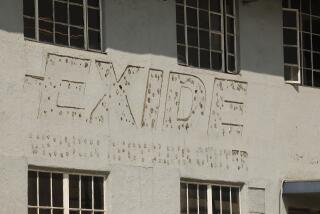Congressional Conferees OK $9-Billion Superfund
- Share via
WASHINGTON — Congressional conferees, breaking a 2 1/2-year deadlock, agreed in principle Thursday to a $9-billion Superfund toxic-waste cleanup program.
The five-year program, to be financed chiefly by the petrochemical industry, includes new standards for neutralizing thousands of hazardous chemical dumps nationwide and new protections for neighboring communities and victims of industrial poisons.
Five-Fold Increase
Funding of the program represents a five-fold increase over the Superfund budget approved in 1980 and was praised by environmental groups for strengthening several cleanup regulations.
But the package, reflecting compromises with industrial interests, falls short of the environmentalists’ goals in other areas.
It fails, for example, to set a timetable for completion of cleanups over the next five years and permits what critics say is a leisurely pace for initiating new remedial actions. It also exempts utilities, hazardous-waste facilities and small companies from new requirements to publicly report chemical inventories and emissions.
Negotiating Since January
House-Senate conferees have been negotiating since January. Their report, which requires approval by both houses of Congress, includes the following provisions:
--Authorization of $8.5 billion to clean up toxic-waste sites and $500 million specifically targeted at the hundreds of thousands of leaky underground storage tanks containing motor fuel that endanger underground water supplies.
The conferees proposed taxing the petrochemical industry for half the money, with another $2 billion taken from profitable U.S. manufacturers. The balance would come from taxpayers and other sources.
Must Meet Standards
--Establishment of cleanup standards at Superfund sites. The dumps must be sufficiently upgraded to meet federal environmental and health standards. The bill discourages temporary remedies and bans transfers of toxic wastes to leaking landfills.
--Requirement that the EPA initiate 375 cleanup projects in the next five years.
--Extension of the statute of limitations for lawsuits by people exposed to environmental diseases with long latency periods. The bill would permit legal claims of victims who discovered their injury after Superfund’s birth in 1980 and linked it to a toxic emission.
More to Read
Get the L.A. Times Politics newsletter
Deeply reported insights into legislation, politics and policy from Sacramento, Washington and beyond. In your inbox twice per week.
You may occasionally receive promotional content from the Los Angeles Times.










